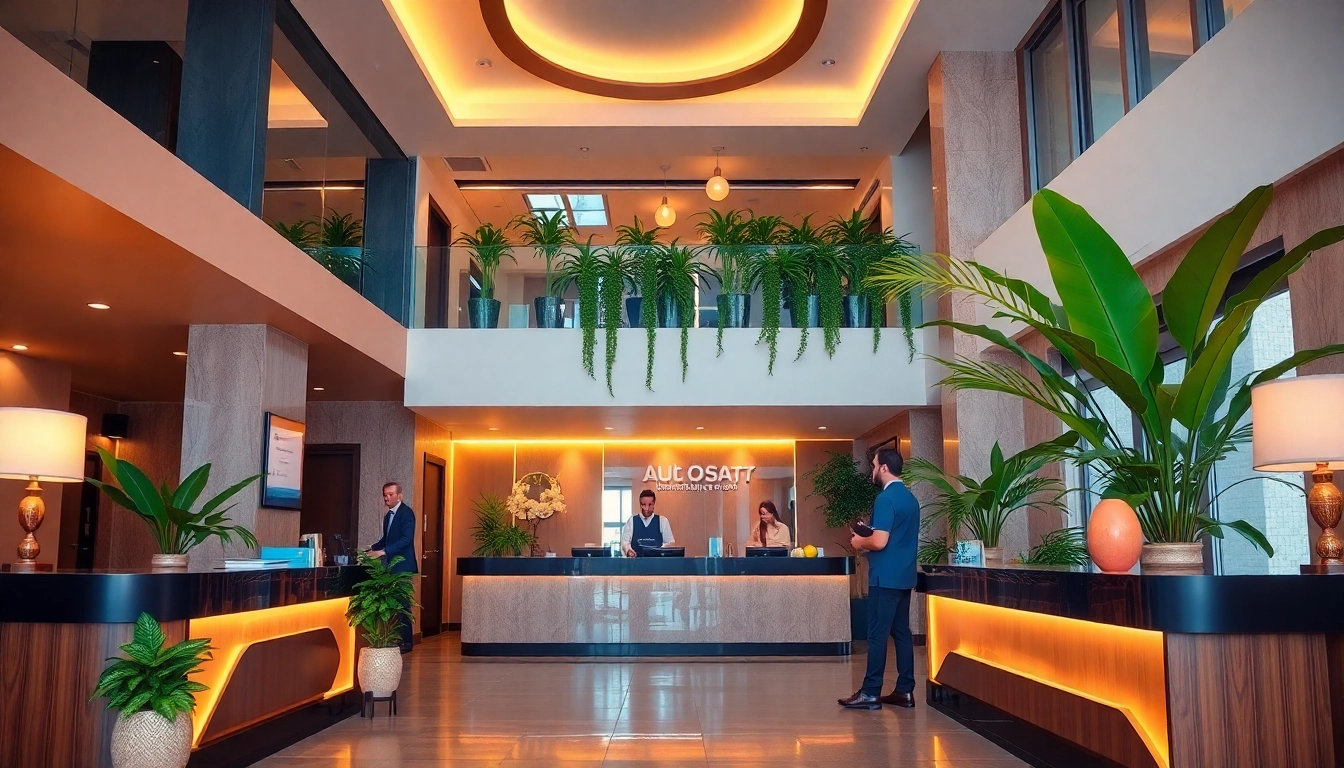Essential Insights into Hotel Management: Navigating Operations and Guest Experience
Understanding Hotel Management
Hotel management is a vital sector within the hospitality industry that encompasses a multitude of functions crucial for the successful operation of hotels. It involves not only the day-to-day management of the hotel staff and operations but also strategic oversight that promotes the growth and profitability of the establishment. Hotel management encompasses roles such as planning, coordinating, and managing all operational aspects, thus ensuring that guests receive the finest service and overall experience. For a deeper dive into hotel management strategies, you may find it useful to explore hotel management practices implemented across various successful establishments.
What is Hotel Management?
At its core, hotel management focuses on the efficient and effective administration of hotel operations. This includes overseeing areas such as guest accommodations, food and beverage, human resources, marketing, and finance. The management team aims to maximize the satisfaction of guests while optimizing the hotel’s overall performance. Effective hotel management requires a blend of leadership skills, an understanding of market dynamics, and the ability to adapt to changing customer preferences.
Key Roles in Hotel Management
The hotel management structure typically features several key roles, each contributing to the operational success of the hotel. These roles include:
- General Manager (GM): The GM holds overall responsibility for hotel operations, financial performance, and guest satisfaction.
- Front Office Manager: Manages front desk operations, reservations, and guest services, acting as the first point of contact for guests.
- Housekeeping Manager: Oversees cleanliness and maintenance of guest rooms and public areas, ensuring standards are met.
- Food and Beverage Manager: Responsible for managing dining services, including kitchen operations and customer service in restaurants and bars.
- Sales and Marketing Manager: Focuses on promoting the hotel and driving bookings through marketing strategies and partnerships.
Importance of Customer Service in Hotel Management
Customer service is the cornerstone of hospitality. Exceptional service can set a hotel apart in a saturated market, leading to repeat business and positive reviews. Staff training in customer interaction, complaint resolution, and personalized service enhances the guest experience. Managers must create a culture of excellence in service, implementing standards that encourage staff to exceed guest expectations consistently.
Core Responsibilities of Hotel Management
Hotel management involves various responsibilities that ensure the seamless operation of the establishment and maintain high standards of guest satisfaction. Here are the core responsibilities that typically fall under hotel management:
Financial Management and Budgeting
Effective financial management is essential for the sustainability of any hotel. This involves creating detailed budgets that project revenue and expenses, analyzing financial reports, and adjusting strategies accordingly. Managers must be adept at forecasting income from various sources, including room sales, food and beverage, and ancillary services, to ensure sustainability. Key financial metrics such as RevPAR (Revenue Per Available Room) and GOPPAR (Gross Operating Profit Per Available Room) are crucial for assessing performance.
Staffing and Human Resources
Staff recruitment, training, and retention are fundamental to hotel management. The human resources department is responsible for hiring skilled personnel, providing ongoing training, and fostering a positive work environment. It’s important to create a culture where employees feel valued and engaged, which in turn leads to better guest service and satisfaction. Performance appraisals and professional development opportunities enhance productivity and morale among hotel staff.
Operational Oversight of Facilities
Hotel management requires overseeing all aspects of hotel facilities, ensuring that they are well-maintained and functioning optimally. This includes regular inspections of rooms, public areas, and amenities. Efficient operational oversight also encompasses managing vendors and suppliers for maintenance, catering, and other services, ensuring that the hotel remains in top condition and delivers a seamless experience for guests.
Challenges in Hotel Management
While hotel management can be rewarding, it also comes with a unique set of challenges that must be navigated effectively. Here are some of the prevalent challenges faced by hotel managers:
Managing Guest Expectations
Guest expectations can be extremely high, especially in a competitive market. Failure to meet these expectations can result in negative reviews, which can impact future business. Hotel managers must implement systems for gathering guest feedback consistently and address areas of concern proactively. Understanding market trends and customer feedback can help hotels meet or exceed expectations effectively.
Adapting to Industry Trends
The hospitality industry is dynamic and frequently exhibits new trends, from technology integration to sustainability practices. Hotel managers must stay informed and adapt to these changes to remain competitive. This includes embracing innovations such as mobile check-in, contactless services, and personalized marketing approaches, as well as responding to the growing demand for eco-friendly practices within the sector.
Handling Crisis Situations Effectively
Crisis management is a crucial skill for hotel managers, who must anticipate and respond effectively to various emergencies, such as natural disasters or public relations crises. Developing a comprehensive crisis management plan that includes staff training and communication strategies is essential to safeguard guests and property while ensuring swift recovery from incidents.
Best Practices for Effective Hotel Management
Implementing best practices in hotel management can significantly improve operations and guest satisfaction levels. Here are several recommendations for achieving effective management:
Emphasizing Training and Development
Ongoing training for all levels of staff enhances service quality and operational efficiency. Developing tailored training programs that address both technical skills and soft skills, such as communication and conflict resolution, ensures that team members are prepared to meet guest needs effectively. Regular workshops and seminars can help in continuously updating staff on industry best practices and emerging trends.
Implementing Technology in Hotel Operations
Technology plays an increasingly critical role in hotel management. Modern property management systems (PMS) can streamline operations, from reservations to billing and customer relationship management. Utilizing tools such as revenue management software and guest engagement platforms allows hotels to optimize inventory management, enhance service delivery, and better understand market demand.
Enhancing Guest Experience through Feedback
Actively soliciting and analyzing guest feedback is vital for identifying areas for improvement. Tools such as guest satisfaction surveys, online reviews, and direct feedback during stays provide valuable insights into guests’ experiences. Implementing necessary changes based on this feedback demonstrates a commitment to service excellence and fosters guest loyalty.
Future of Hotel Management
Looking ahead, the landscape of hotel management is poised to change as new trends and technologies emerge. Understanding these changes is crucial for staying competitive in the hospitality market.
Emerging Trends to Watch
Future trends in hotel management include greater reliance on data analytics to inform decision-making, the adoption of artificial intelligence for personalized guest experiences, and the introduction of health and wellness amenities to meet changing consumer preferences. Embracing these trends will be essential for hotels seeking to enhance their competitive edge.
Impact of Sustainability on Hotel Management
Sustainability is becoming a priority for both consumers and businesses. Hotels must adopt eco-friendly practices such as waste reduction, energy conservation, and sustainable sourcing to appeal to environmentally conscious guests. Developing a sustainability plan not only meets customer expectations but can also lead to cost savings and increased operational efficiency.
How to Stay Competitive in the Hospitality Market
To remain competitive, hotel management must focus on unique selling propositions (USPs) that differentiate their offerings from those of their competitors. This can include exceptional service, unique experiences, or innovative promotions. Continuous market research, adaptability, and an understanding of guest preferences will also help hotels to thrive amid fierce competition.
Conclusion
The landscape of hotel management is multifaceted and evolving. Those in the industry must be equipped with a comprehensive understanding of operations, engage in consistent training, adapt to industry trends, and prioritize guest satisfaction. The successful management of a hotel not only contributes to the business’s profitability but also ensures that guests leave with positive experiences that will encourage their return. As the hospitality industry continues to evolve, the importance of effective hotel management will remain paramount in delivering exceptional service and achieving long-term success.












Post Comment